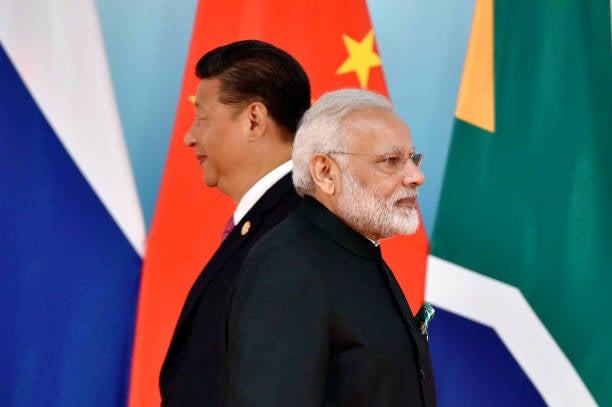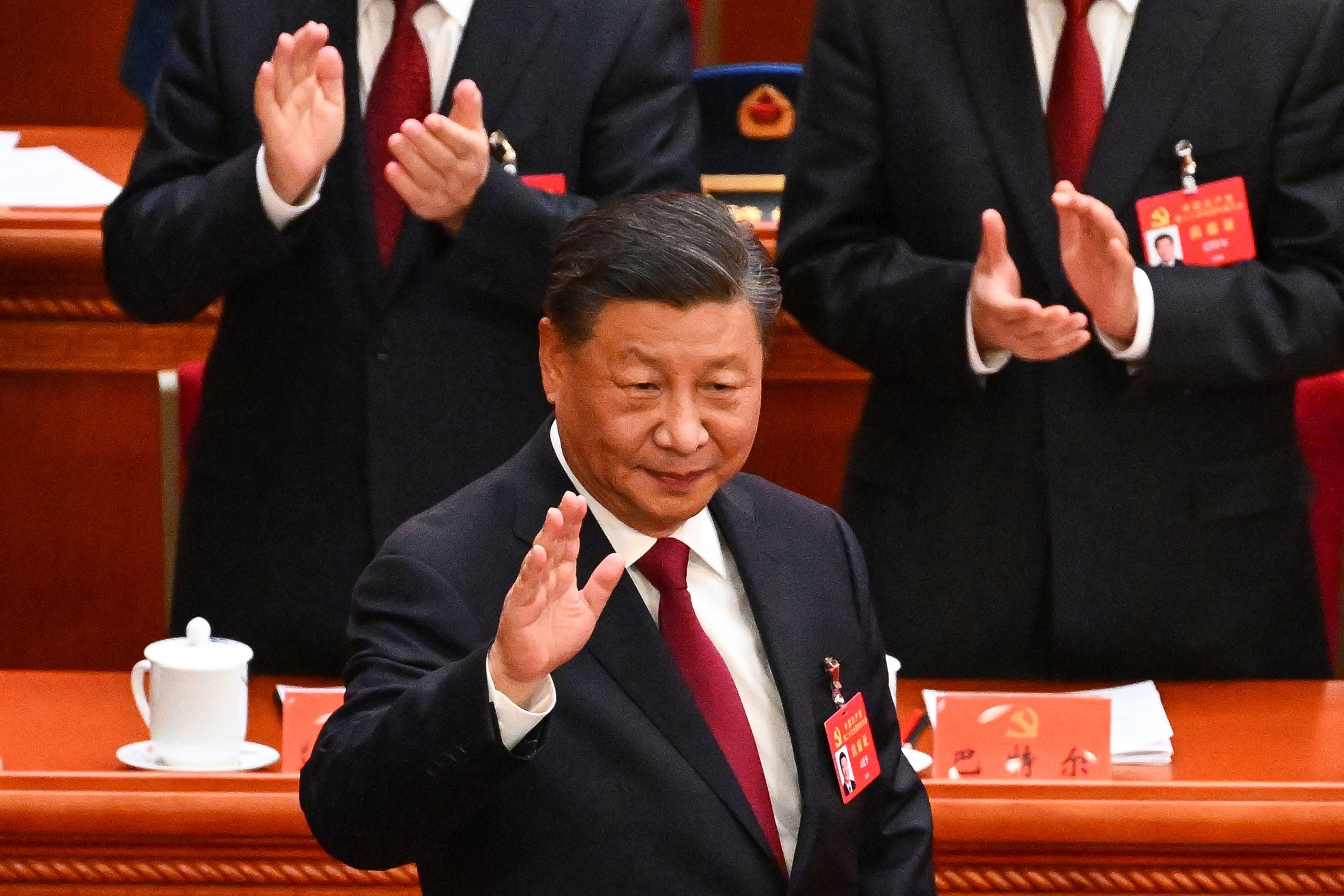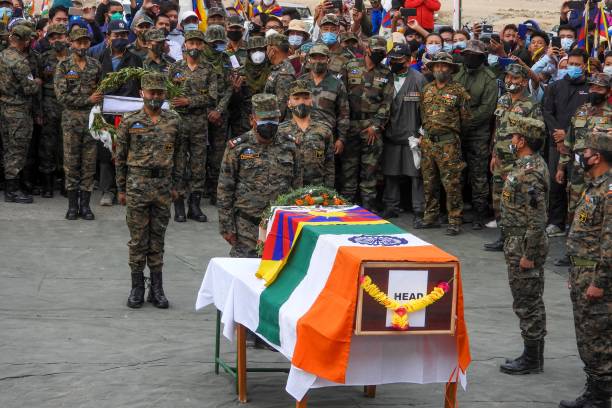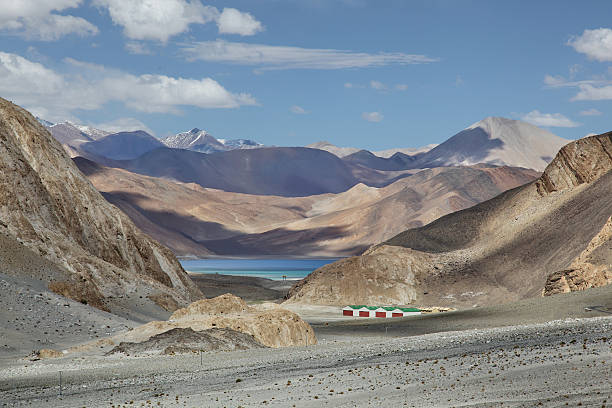Can India afford not to stand up to Chinese aggression over Taiwan?
As New Delhi and Washington prepare for major joint drills despite objections from Beijing, analysts warn India that China’s bullish behaviour ‘won’t end with Taiwan’. Shweta Sharma reports


Amid mounting international concern that China could attempt to take over Taiwan by force, India and the United States are set to stage major high-altitude war games in the Himalayas this month – the closest ever to the Chinese border – in a move that has drawn strong objections from Beijing.
Some analysts fear a disproportionate response to the drills from China, which remains in a state of heightened military engagement along sections of its Himalayan border with India since tensions there flared into deadly clashes in 2020.
The world watched with alarm as China responded in dramatic fashion to a US congressional visit to Taiwan, led by House speaker Nancy Pelosi, in August. China fired ballistic missiles over the island as part of its biggest ever military exercise in the region, an apparent dry run for a full-scale invasion.
Despite its own terse relations with Beijing, India refused to join in with the strong international condemnation at the time of the Taiwan drills, waiting more than a week to urge “restraint” in the crisis.
Now, however, New Delhi’s decision to go ahead with the 18th edition of the US-Indian exercises known as Yudh Abhyas (war practice), barely 95km from its disputed border with China, is taking on far greater significance in the context of Beijing’s increasingly aggressive stance towards its neighbours.
The drills are to take place at an altitude of 10,000ft in Auli, Uttarakhand, and will last two weeks. Details are scarce, though both sides have talked up the scale and importance of the war games, which will involve the sharing of expertise and technologies relating to high-altitude warfare. Indian defence sources told the PTI news agency that the “mega exercise” would encompass a number of different “complex drills”.
The exercises also come at a busy time domestically for China, with Xi Jinping set to cement his place as the country’s most powerful ruler since Mao Zedong, securing an unprecedented third five-year term as Chinese Communist Party leader at the 20th party congress.
Some analysts are now calling on India to forge closer ties with Taiwan, even at the expense of its long-maintained status as a non-aligned third party between the world’s two biggest superpowers, or risk seeing its own territory under threat from an emboldened China in the near future.
Sana Hashmi, a fellow at the Taiwan-Asia Exchange Foundation and former consultant with India’s foreign affairs ministry, tells The Independent that India and Taiwan are dealing with similar threats and challenges from China, given that Beijing opted to escalate tensions in the Himalayan region and across the Taiwan Strait at the same time.
“This was one of the reasons why we are seeing an alteration in India’s Taiwan policy, and how for the first time India expressed concerns regarding China’s unilateral actions toward changing the status quo and militarisation of the Taiwan Strait,” Dr Hashmi says, referring to a statement issued by India’s foreign minister 10 days after China’s Taiwan war drills began.
She says Beijing will be concerned by the high-altitude border drills as they could be a sign that countries like India are moving away from paying heed to China’s foreign policy “red lines” and sensitivities.

Given that the timing of the drills coincides with the opening of the 20th party congress, “we might see China getting more aggressive at the border front with India”, she says, adding that Beijing could easily use the exercises as another excuse to delay disengagement at the border or even begin another incursion.
In his speech on Sunday at the vast Great Hall of the People in Beijing’s Tiananmen Square, President Xi wasted little time in addressing the Taiwan issue. He doubled down on his warning to “external” and “separatist” forces against any kind of interference as he promised that “complete reunification” of Taiwan with mainland China “will be achieved” – a line that drew the loudest and longest round of applause from the audience of some 2,300 delegates.
Like many countries, India does not have formal diplomatic ties with Taiwan, but enjoys strong bilateral trade with the self-governing island, which rose 185 per cent from $2bn (£1.7bn) in 2006 to $5.7bn (£5.04bn) in 2020.
And India has also set a precedent for resisting Chinese pressure on the Taiwan issue, refusing to publicly reiterate support for a “one-China policy” in a stance that dates back more than 12 years, in protest against the way in which China processes visas for Indian citizens from the border regions it disputes.
The latest demand for India to publicly back Beijing’s one-China principle came earlier this month, after Indian media reports quoted Taiwan’s representative to India, Baushuan Ger, as saying Taiwan and India should join forces to “fend off ... the expansion of autocracy”. “Both India and Taiwan are threatened by authoritarianism; hence, closer collaboration between the two is not only desirable but necessary,” he told PTI.
Wang Xiaojian, a spokesperson for China’s embassy in Delhi, said these reports promoted “Taiwan independence” and called on the Indian government to “adhere to the one-China principle and stop any form of official exchange with Taiwan”.
The time has come for India to reassess its policy towards Taiwan and see what it has gained from adhering to a one-China policy, which has limited it from developing closer ties with Taiwan, says Harsh V Pant, professor of international relations at the King’s India Institute at King’s College London.
“India has not gained anything by following a particular approach on Taiwan which is very cautious and defensive, as it has also come under pressure from the PLA [the Chinese army], and China has not reciprocated the idea that there is one India that includes Arunachal Pradesh, Kashmir and Ladakh,” he says.

At the same time as having clear benefits to gain from closer ties with Taiwan, India has something in common with the government in Taipei: at least part of its territory is claimed by Beijing to be part of China.
As well as laying claim to parts of the Kashmir valley (alongside Pakistan) and to other stretches along the disputed Himalayan LAC (the “line of actual control”), China says its territory should include the entirety of the northeastern Indian state of Arunachal Pradesh, an area almost three times the size of Taiwan, which is shown as “Zangnan” on Chinese maps.
Dr Hashmi says these claims alone should be enough to make any Chinese invasion of Taiwan an alarming prospect for India. “As has been highlighted by the Taiwanese foreign minister before, China’s aggression won’t end with Taiwan,” she explains.
“Once the CCP leadership settles the Taiwan question, it will further bolster its territorial ambitions, and we might get to see more stand-offs that are much more serious in intensity and scope.”

Jagannath Panda, an expert in Indo-Pacific affairs, says an escalation of tensions with India to match those with Taiwan is not necessarily likely, given China’s party congress is mainly a time for the regime to focus on solidifying Xi’s political backing and managing domestic issues.
“But China is very good at giving surprises, so you never know. There is a lot that can be done even without formally acknowledging [or] having formal political relations with Taiwan,” he says, adding that India “should be a bit more proactive when it comes to Taiwan”.

Dr Panda says Taiwan has emerged as a critical economy in the Indo-Pacific region, with very positive economic connections and policies towards both India and the wider Asean (Association of South East Nations) region.
“India should take advantage of that. India should establish [much] closer trade and economic ties with Taiwan on a range of other issues, particularly science and technology, the supply chain, semiconductors and education and cultural exchanges,” he says.
India’s diplomatic position on the Taiwan-China conflict is being watched closely by New Delhi’s allies and partners, after the Modi government’s reluctance to rein in Moscow over the war in Ukraine frustrated the Western world. India has not only abstained from several UN votes on motions against Russia, but has also increased its imports of crude oil, coal, and fertilisers from the country.
But if the Indian government’s primary responsibility is to protect its own “national interests” and the livelihoods of its citizens, as it stated to justify its position on Ukraine, then what that means for its position on Taiwan is a lot less clear cut.
Its recent Taiwan manouevres represent something more fundamental about China’s shifting mindset and its vision for the global order – something that is already having implications for India, says Professor Pant.
“We cannot talk about freedom of navigation, we cannot talk about international law, we cannot talk about a free and open Indo-Pacific while Taiwan is facing the kinds of challenges it is facing,” he says. “It is time to articulate an engagement with Taiwan more explicitly, and [for] explicit recognition that Taiwan is an important anchor in the Indo-Pacific.”
Barbara Kelemen, lead analyst for Asia at Dragonfly Intelligence, says China has already been “pursuing a kind of salami-slicing strategy” when it comes to the India-held territory it claims in the Himalayas. Even though there hasn’t been a significant flare-up of violence on the border since 2020, “ongoing construction and building of infrastructure [in the region] is something that China hasn’t really stopped”, she says.
A Chinese invasion of Taiwan, she explains, would be a “major challenge” for India in this context. “Setting aside the obvious operational disruption and economic impact, India has its own disputed territory.
“It’s not clear what position India would take, but there would be reason for concern if this were to take place.”
Beijing-based political analyst Einar Tangen tells The Independent that there would undoubtedly be costs if New Delhi did try to forge stronger relations with Taipei, saying China would “undoubtedly respond”.
“Rather than strengthening India’s negotiating position with China, it will harden the stances of both, resulting in wasted energy and lost time,” he says.
He argues that India’s “diplomatic dance” between allegiance to its Western partners and its fellow developing nations will have “no positive economic results for India”.
“In the end, India needs to decide its own future,” he adds.






Join our commenting forum
Join thought-provoking conversations, follow other Independent readers and see their replies
Comments